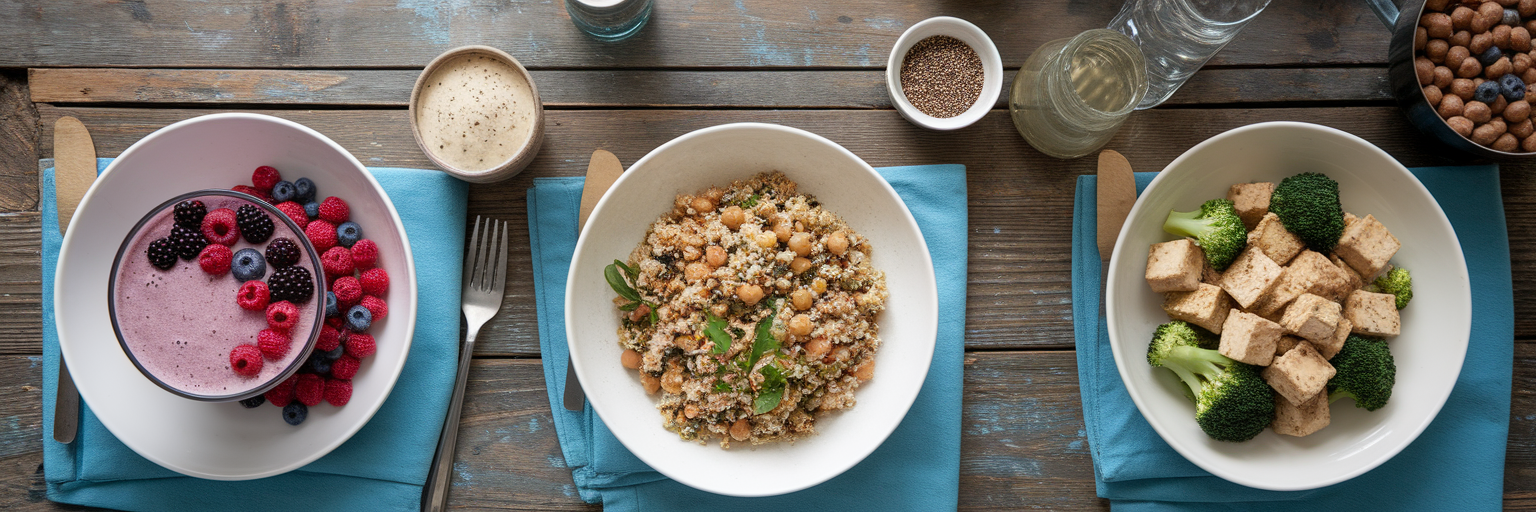The Foundation of Muscle Repair and Growth
Every workout, whether it's lifting weights or a long run, creates microscopic tears in your muscle fibres. This isn't a bad thing; it's the necessary stimulus for growth. Your body responds by repairing these tears, building the muscle back stronger and larger than before. The raw materials for this repair job are amino acids, which are the building blocks of protein.
This entire rebuilding process is called Muscle Protein Synthesis (MPS). For your muscles to actually grow, the rate of MPS must consistently be higher than the rate of muscle protein breakdown. Think of it as a construction site: you need to bring in more bricks than you lose for the wall to get taller. To effectively trigger this synthesis, your body requires a complete set of all nine essential amino acids.
Among these, the amino acid leucine acts as the primary signal, essentially telling your body to start the rebuilding process. This is why the quality of your protein source matters. A complete protein ensures you have all the necessary tools, especially leucine, to kickstart and sustain effective muscle repair.
The Pre-Workout Protein Advantage

Many people associate protein shakes exclusively with post-workout recovery, but consuming protein before you train offers a distinct advantage. Think of it like stocking your pantry before you start cooking. By having a protein shake 60 to 90 minutes before your session, you pre-load your bloodstream with a steady supply of amino acids. This ensures your muscles have immediate access to building blocks right when they need them during exercise.
This proactive approach helps minimise muscle breakdown while you train. When your body has readily available amino acids, it’s less likely to turn to your existing muscle tissue for energy, a process known as catabolism. This can translate into tangible performance benefits, such as better endurance during a long run or more strength for that final set of squats. The key is to keep it light and easily digestible. You want to fuel your workout, not weigh yourself down.
So, when to take vegan protein for this benefit? A simple shake made with a quality powder is ideal. For some delicious ideas that won't sit heavy in your stomach, you can explore our collection of 3 easy vegan protein recipes you'll actually crave.
Maximising Recovery with Post-Workout Protein
The moments after your workout are when the real magic of muscle growth begins. You may have heard of the "anabolic window," a supposed 30-minute timeframe for optimal protein absorption. While modern science suggests this window is likely wider than once thought, consuming protein promptly after exercise remains a highly effective strategy. Your muscles are uniquely sensitive to nutrients at this time, ready to soak up amino acids to begin the repair process.
A post workout vegan protein shake delivers a rapid infusion of these essential building blocks directly to your tired muscle fibres. This kickstarts the recovery cycle and promotes hypertrophy, which is the scientific term for muscle growth. For an even better recovery, consider pairing your protein with a source of carbohydrates, like a banana or a handful of dates in your shake.
Why the combination? Intense exercise depletes your muscle glycogen, which is your body's stored energy. The carbohydrates work to replenish these stores, which frees up the protein to be used exclusively for its main job: repairing and rebuilding muscle tissue. A fast-absorbing shake, like our Chocolate Vegan Protein, delivers 25g of complete protein to kickstart the recovery process immediately.
Beyond the Workout Window: Daily Protein Distribution

While pre and post-workout nutrition helps optimise your results, the single most important factor for muscle growth is achieving your total daily protein target consistently. Focusing only on the two-hour window around your workout can mean you miss the bigger picture. True plant based protein timing is an all-day strategy.
Think of it like watering a plant. A single, massive downpour once a day is far less effective than consistent, steady hydration. Similarly, spreading your protein intake evenly across three to four meals helps maintain a constant supply of amino acids in your bloodstream. This keeps muscle protein synthesis elevated throughout the day and prevents your body from slipping into a catabolic state between meals.
This approach ensures your muscles are continuously nourished, not just immediately after exercise. Here is a sample plan to illustrate how you can distribute your protein intake effectively.
| Meal/Snack | Timing | Protein Goal & Example |
|---|---|---|
| Breakfast | 7:00 AM | 25-30g: Protein smoothie with spinach and berries |
| Lunch | 12:30 PM | 25-30g: Large quinoa salad with chickpeas and tofu |
| Pre-Workout | 4:30 PM (90 mins before workout) | 20-25g: A light vegan protein shake with water |
| Post-Workout | 6:30 PM (Within 60 mins of workout) | 25-30g: A recovery shake with a banana |
| Dinner | 7:30 PM | 25-30g: Lentil and vegetable stir-fry |
This table illustrates how to distribute protein intake evenly throughout the day to maintain consistent muscle protein synthesis. Timings and meal examples are suggestions and can be adapted to individual schedules and dietary needs.
Tailoring Protein Intake to Your Fitness Goals
Effective protein timing isn't one-size-fits-all. The best strategy depends on what you want to achieve. By aligning your intake with your specific objectives, you can make your nutrition work smarter for you. Let's look at two common goals.
- For Muscle Growth (Hypertrophy): If your primary goal is building muscle, both total intake and timing are vital. Aim for a higher daily protein target, generally around 1.6 to 2.2 grams per kilogram of body weight. For optimal vegan protein for muscle growth, ensure you are consuming protein both before and after your workouts, and distribute the rest evenly throughout the day. Adding a protein-rich snack between meals can help you hit your target and keep your muscles in an anabolic state.
- For Weight Management: When you're in a calorie deficit to lose weight, protein becomes crucial for a different reason. It helps preserve lean muscle mass, which keeps your metabolism running efficiently. Timed protein intake can also increase satiety, helping you feel fuller for longer and reducing cravings. Using a protein shake as a nutrient-dense, low-calorie snack or meal replacement can be an effective strategy to stay on track without feeling deprived.
Furthermore, as research in Frontiers in Nutrition suggests, combining different plant proteins enhances their overall efficacy, ensuring you get a complete amino acid profile to support muscle synthesis effectively. For more in-depth articles on nutrition and training, visit our blog.
Optimising Your Vegan Protein's Effectiveness
A common question that arises is whether plant-based proteins are as effective as their animal-based counterparts. Historically, some plant proteins were considered incomplete or less bioavailable. However, modern formulations have completely changed the game. High-quality vegan protein powders are now designed to deliver exceptional results.
The solution lies in creating smart blends. By combining complementary protein sources, such as pea and brown rice protein, we can create a complete amino acid profile that is just as effective for muscle building. These blends ensure you receive all the essential amino acids, including high levels of leucine, in a form that your body can easily digest and utilise.
Ultimately, your success comes down to a powerful combination: a superior, well-formulated product and a smart, consistent timing strategy aligned with your personal goals. You have the power to fuel your body effectively and achieve your fitness ambitions without compromise. Choosing the right product is the first step, and our guide to the best protein powders can help you understand what to look for.



